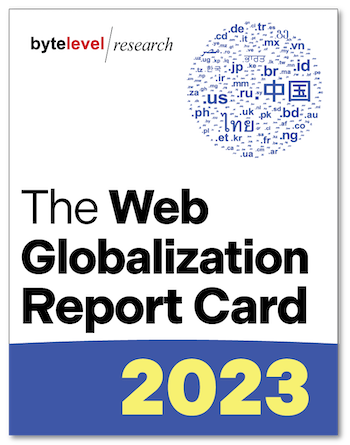I’m pleased to announce the publication of the 2023 Web Globalization Report Card.
This is the 19th annual edition of the Report Card, yes, 19th. And while there are a number of very familiar faces in this list, there are some new entrants worth highlighting as well. But let’s first look at the top 25 global websites:
- Wikipedia
- Airbnb
- Nestlé
- Philips
- Spotify
- Adobe
- IKEA
- Netflix
- Uber
- Amazon
- Microsoft
- Booking.com
- Deloitte
- Apple
- DHL
- KPMG
- Volvo Cars
- NIVEA
- Canon
- Nikon
- Tinder
- Intel
- Ford
- 3M
Wikipedia emerged on top yet again, proving that you don’t need to a be multinational corporation to successfully communicate with the world. You need only build a world-ready template and recruit a passionate group of content creators and translators from around the world with a shared mission of unlocking information for all. With support for more than 300 languages, Wikipedia puts corporate websites like Google and Facebook to shame.
Airbnb continues to iteration on its pioneering use of machine translation software. Any organization curious about presenting users with machine translation in a way that manages language expectations would be wise to study this site.
You don’t need to be a software company to exhibit best practices in web globalization. Regulars on this list in Nestlé, IKEA, Volvo and NIVEA.
A new entrant to the list is Bosch, a global, diversified company with many different product websites that still manage to share a global design template — no easy feat.
As a group, these 25 websites support an average of 58 languages.
But one does not make it into this list based purely on languages, which account for just 25% of the website score. A website must excel across a number of web globalization criteria, which is documented in the Report Card.
Congratulations to the teams who have helped to make these websites world-ready and locally successful.
Click here to learn more about the Report Card.

